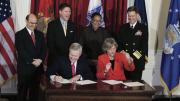An agreement signed on March 4 by President Drew Faust and U.S. Secretary of the Navy Ray Mabus clears the way for the Naval Reserve Officers Training Corps (NROTC) program to return to Harvard’s campus once the “Don’t Ask, Don’t Tell” (DADT) policy’s repeal—enacted by Congress in December—takes effect. That is expected to happen as soon as this summer, ending nearly 40 years of formal separation dating from the Vietnam War era.
The agreement provides for:
- appointment by the University of an NROTC director at Harvard, with office space, and access to classrooms and athletic fields (for drilling and military exercises) for participating students; and
- resumption by Harvard of direct financial responsibility for the costs of student participation in the program (such costs have been covered in recent decades by alumni donations).
Harvard Navy and Marine Corps midshipmen will continue to take their NROTC classes at MIT, home to the courses and faculty who have trained area students enrolled in the program recently. (Military leaders have indicated it is uneconomical to expand the number of ROTC programs to multiple campus sites that each serve a potentially small number of students.) The news release announcing the new arrangement noted that maintaining the current consortium arrangement is “best for the efficiency and effectiveness” of the operations. From Harvard’s perspective, this means that issues of faculty appointments and class credit for ROTC courses within the College curriculum—potential deal-breakers—do not arise now.
Faust had previously indicated strong support for renewing ties to ROTC once the prohibition on military service by openly gay men and women was abolished. She attended commissioning ceremonies during Commencement week, and seemed to establish a strong rapport with General David H. Petraeus (now leading U.S. military operations in Afghanistan) when he spoke at the 2009 exercises. In the news release, Faust said, “Our renewed relationship affirms the vital role that the members of our Armed Forces play in serving the nation and securing our freedoms, while also affirming inclusion and opportunity as powerful American ideals. It broadens the pathways for students to participate in an honorable and admirable calling and in so doing advances our commitment to both learning and service.”
Mabus called the agreement “good for the University, good for the military, and good for the country. Together, we have made a decision to enrich the experience open to Harvard’s undergraduates, make the military better, and our nation stronger.” The decision may have resonated for Mabus on several levels: he rose to the rank of lieutenant during his own navy service; holds a Harvard Law degree (J.D. ’75); and was in Cambridge at the start of junior parents’ weekend (daughter Elisabeth is a student in the College).
Harvard is also pursuing discussions to renew formal ties with ROTC programs serving other military branches. And Faust will form an ROTC implementation committee chaired by Cabot associate professor in applied science Kevin (“Kit”) Parker, an army major who has served three tours in Afghanistan. (His bioengineering research has recently been expanded to include traumatic brain injury, prompted by his military experience.)
Twenty undergraduates now participate in ROTC programs, including 10 in NROTC. In addition to Faust’s interest in restoring the program, Harvard may be enjoying a bit of geographic luck—in the proximity of the current ROTC operations just downriver at MIT—in gaining an ROTC presence on campus so quickly. Other institutions that have taken steps to re-establish ROTC in the wake of DADT’s repeal, including Stanford and Yale, are less fortunately situated.









